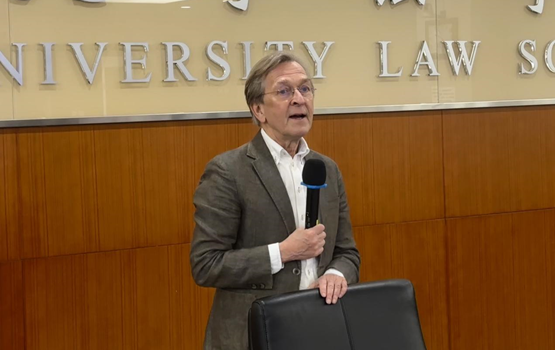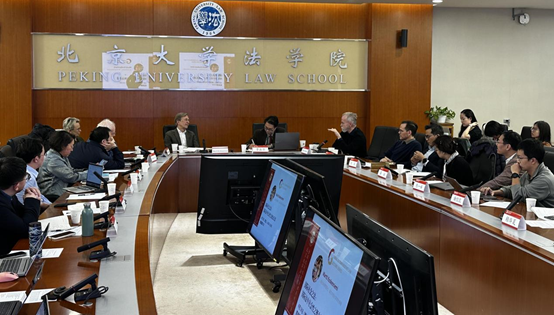
The 50th session of the “Adventus Amicorum” seminar series organized by the Institute of Area Studies, Peking University (PKUIAS) took place on April 18, 2025. The seminar invited Martti Koskenniemi, Academician of Science and Professor Emeritus of International Law at the University of Helsinki. The seminar was hosted by Zhang Yongle, deputy director of PKUIAS and a tenured associate professor at Peking University Law School. Additional experts participating in the discussion included: Prof. David Kennedy from Harvard Law School, Prof. Zhao Hong from Peking University Law School, Visiting Professor Anthony Carty from Peking University Law School, Associate Professor Chen Yifeng from Peking University Law School, Assistant Professor Liu Yang from Renmin University of China, Lecturer Cao Wenjiao from China Foreign Affairs University, Assistant Professor Xie Kankan from the School of Foreign Languages at Peking University, Assistant Professor Lai Huaxia from the School of International Studies at Peking University, Assistant Professor Chen Xiaohang from Peking University Law School, Postdoctoral Fellow Huang Pengbei from the International Law School at China University of Political Science and Law, and Postdoctoral Fellow Lin Zhaoran from the Law School and Marine Research Institute at Peking University.
Before reviewing the historical evolution of international law and the concept of society, Koskenniemi first pointed out that, in his view, international law is a “German discipline.” One of the key historical starting points for this discipline was the political reconstruction of Europe following the Napoleonic Wars in the 19th century. During this period, Koskenniemi introduced the thinking of prominent legal scholars, such as Georg Friedrich von Martens, G.W. Hegel, Lorenz von Stein and Robert von Mohl, on the concept of international law. He noted that the professionalization of international law as a discipline could be traced back to the founding of the Institute of International Law in 1873. The organization aimed to advance liberal reforms in Europe through the codification of international legal norms and positioned itself as the “legal conscience of the civilized world.” Johann Caspar Bluntschli, one of its founding members, emphasized that civilized nations are the governors and representatives of international law.
In discussing the development of international law from the late 19th to early 20th century, Koskenniemi focused on the international law theories of Georg Jellinek and Lassa Oppenheim. Jellinek argued that international law is founded on the will of the state, with “self-binding” serving as the legal basis for its obligations, while Oppenheim saw the society of nations as a “Christian family.” After World War I, people began seeking a broader expression that went beyond the concept of the Christian family.
Koskenniemi then explored the intersections of international law with sociology and international relations. In sociology, Julius Stone pointed out that, due to the challenges of integrating diplomatic experience into international law research, sociological studies primarily rely on statistical data and public opinion surveys. In international relations, Edward Hallett Carr criticized the idea that international interests could coexist harmoniously. Meanwhile, scholars from the British School, such as Hedley Bull and Adam Watson, further examined the concept of international society and international interactions.
Koskenniemi also emphasized that by the 1980s, the concept of “international society” had become embodied in global markets and commercial production relations. In the 1990s, it symbolized a series of global social movements, marking the gradual decline of traditional state-centric paradigms. He concluded that the concept of “international society” has always served as a framework accommodating various challenges to the notion of state sovereignty. Today, scholars no longer limit themselves to the traditional concept of “international law,” but instead favor terms such as “global law” or “transnational law,” reflecting a shift from the 19th-century paradigm of international law to the 21st-century field of transnational legal studies.

In the following discussion, Anthony Carty raised objections to the historical origins of international law. Zhao Hong discussed how to build common values and interests at the international society level. Liu Yang addressed the instrumental nature of the discourse on “international society” and the issue of dominance. Xie Kankan explored the relationship between international law and colonialism. Cao Wenjiao inquired about the basis of international society. Lai Huaxia reviewed the relationship between constructivism in international relations theory and international law and proposed future trends for the development of international law. Chen Yifeng argued that opposing international law to sociology unduly narrows the scope and substance of international legal inquiry. David Kennedy noted that Koskenniemi had outlined three distinct approaches to studying international legal vocabularies, and posed two further questions: How might these three approaches be meaningfully connected? And which of them is most relevant when examining the concept of “society”? Koskenniemi responded to each of these points in depth. Zhang Yongle concluded the seminar, thanking Prof. Koskenniemi for his insightful lecture and the participants for their enthusiastic discussion. He expressed the hope that similar seminars would be held in the future to further promote diverse perspectives on international law and its future development.


